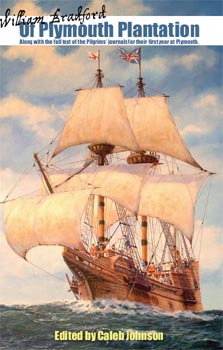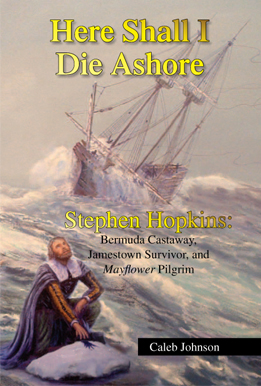Letter of Robert Cushman to Edward Southworth
Dartmouth, August 17 [1620]
Loving Friend,
My most kind remembrance to you and your wife, with loving E.M. etc., whom in this world I never look to see again. For besides the eminent dangers of this voyage, which are no less than deadly, an infirmity of body hath seized me, which will not in all likelihood leave me till death. What to call it I know not, but it is a bundle of lead, as it were, crushing my heart more and more these fourteen days; as that although I do the actions of a living man, yet I am but as dead, but the will of God be done.
Our pinnace will not cease leaking, else I think we had been half-way to Virginia. Our voyage hither hath been as full of crosses as ourselves have been of crookedness. We put in here to trim her; and I think, as others also, if we had stayed at sea but three or four hours more, she would have sunk right down. And though she was twice trimmed at Hampton, yet now she is as open and leaky as a sieve; and there was a board a man might have pulled off with his fingers, two foot long, where the water came in as at a mole hole. We lay at Hampton seven days in fair weather, waiting for her, and now we lie here waiting for her in as fair a wind as can blow, and so have done these four days, and are like to lie four more, and by that time the wind will happily turn as it did at Hampton. Our victuals will be half eaten up, I think, before we go from the coast of England, and if our voyage last long, we shall not have a month's victuals when we come in the country.
Near £700 hath been bestowed at Hampton, upon what I know not; Mr. Martin saith he neither can nor will give any account of it, and if he be called upon for accounts, he crieth out of unthankfulness for his pains and care, that we are suspicious of him, and flings away, and will end nothing. Also he so insulteth over our poor people, with such scorn and contempt, as if they were not good enough to wipe his shoes. It would break your heart to see his dealings, and the mourning of our people; they complain to me, and alas! I can do nothing for them. If I speak to him, he flies in my face as mutinous, and saith no complaints shall be heard or received but by himself, and saith they are froward and waspish, discontented people, and I do ill to hear them. There are others that would lose all they have put in, or make satisfaction for what they have had, that they might depart; but he will not hear them, nor suffer them to go ashore, lest they should run away. The sailors are so offended at his ignorant boldness in meddling and controlling in things he knows not what belongs to, as that some threaten to mischief him; others say they will leave the ship and go their way. But at the best this cometh of it, that he makes himself a scorn and laughing stock unto them.
As for Mr. Weston, except grace do greatly sway him, he will hate us ten times more than ever he loved us, for not confirming the conditions. But now, since some pinches have taken them, they begin to revile the truth and say Mr. Robinson was in the fault who charged them never to consent to those conditions, nor choose me into office; but indeed appointed them to choose them they did choose. But he and they will rue too late, they may now see, and all be ashamed when it is too late, that they were so ignorant; yea and so inordinate in their courses. I am sure as they were resolved not to seal those conditions, I was not so resolute at Hampton to have left the whole business, except they would seal them, and better the voyage to have been broken off then than to have brought such misery to ourselves, dishonour to God and detriment to our living friends, as now it is like to do. Four or five of the chief of them which came from Leyden, came resolved never to go on those conditions. And Mr. Martin, he said he never received no money on those conditions; he was not beholden to the merchants for a pin, they were bloodsuckers, and I know not what. Simple man, he indeed never made any conditions with the merchants, nor ever spake with them. But did all that money fly at Hampton, or was it his own? Who will go and lay out money so rashly and lavishly as he did, and never know how he comes by it or on what conditions? Secondly, I told him of the alteration long ago and he was content, but now he domineers and said I had betrayed them into the hands of slaves; he is not beholden to them, he can set out two ships himself to a voyage. When, good man? He hat but £50 in and if he should give up his accounts he would not have a penny left him, as I am persuaded, etc.
Friend, if ever we make a plantation, God works a miracle, especially considering how scant we shall be of victuals, and most of all ununited amongst ourselves and devoid of good tutors and regiment. Violence will break all. Where is the meek and humble spirit of Moses? and of Nehemiah who re-edified the walls of Jerusalem, and the state of Israel? Is not the sound of Rehoboam's brags daily here amongst us? Have not the philosophers and all the wise men observed that, even in settled commonwealths, violent governors bring either themselves or people or both to ruin? How much more in the raising of commonwealths, when the mortar is yet scarce tempered that should bind the walls! If I should write to you of all things which promiscuously forerun our ruin, I should over-charge my weak head and grieve your tender heart. Only this, I pray you prepare for evil tidings of us every day. But pray for us instantly, it may be the Lord will be yet entreated one way or other to make for us. I see not in reason how we shall escape even the gaspings of hunger-starved persons; but God can do much, and His will be done. It is better for me to die than now for me to bear it, which I do daily and expect it hourly, having received the sentence of death both within me and without me. Poor William Ring and myself do strive who shall be meat first for the fishes; but we look for a glorious resurrection, knowing Christ Jesus after the flesh no more, but looking unto the joy that is before us, we will endure all these things and account them light in comparison of that joy we hope for.
Remember me in all love to our friends as if I named them, whose prayers I desire earnestly and wish again to see, but not till I can with more comfort look them in the face. The Lord give us that true comfort which none can take from us. I had a desire to make a brief relation of our estate to some friend. I doubt not but your wisdom will teach you seasonably to utter things as hereafter you shall be called to it. That which I have written is true, and many things more which I have forborn. I write it as upon my life, and last confession in England. What is of use to be spoken presently, you may speak of it; and what is fit to conceal, conceal. Pass by my weak manner, for my head is weak, and my body feeble. The Lord make me strong in Him, and keep both you and yours.
Your loving friend,
ROBERT CUSHMAN
Dartmouth, August 17, 1620



